Unit 8 It must belong to Carla. Section A grammar Focus-4c课件37张
文档属性
| 名称 | Unit 8 It must belong to Carla. Section A grammar Focus-4c课件37张 | 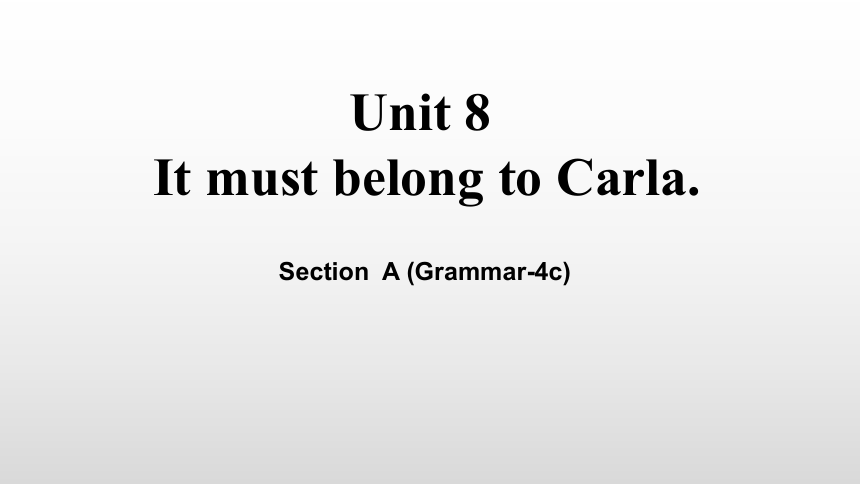 | |
| 格式 | zip | ||
| 文件大小 | 351.9KB | ||
| 资源类型 | 教案 | ||
| 版本资源 | 人教新目标(Go for it)版 | ||
| 科目 | 英语 | ||
| 更新时间 | 2021-09-01 21:54:20 | ||
图片预览

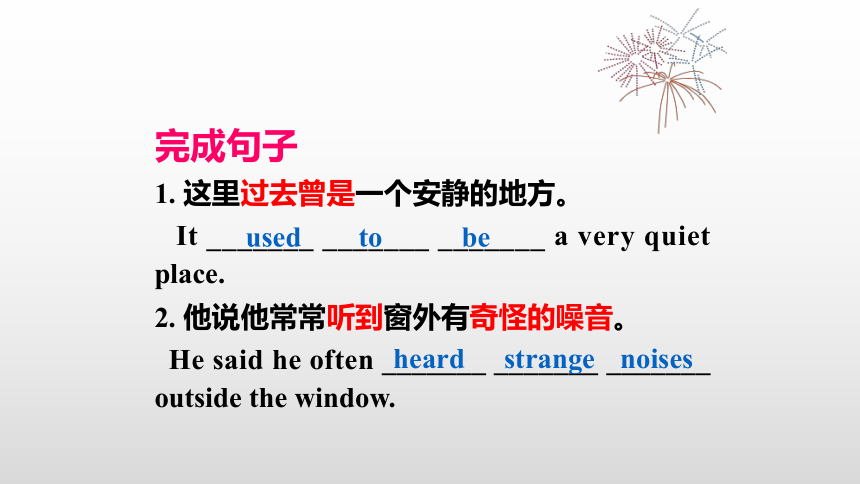
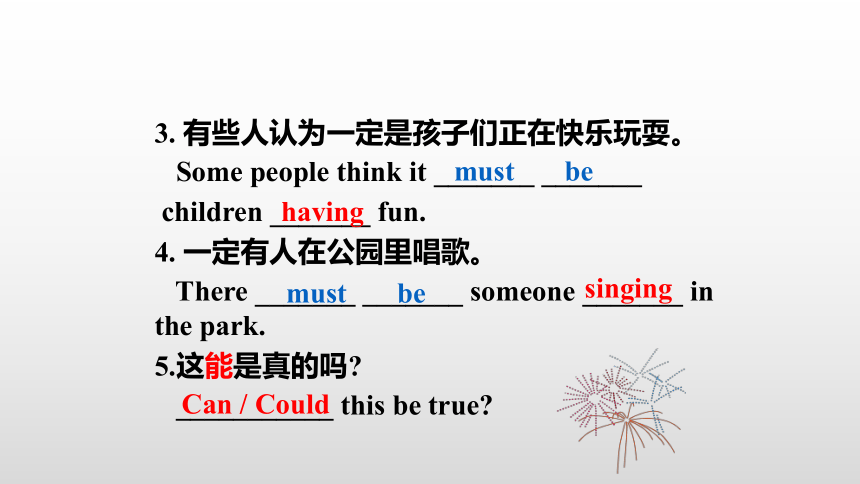
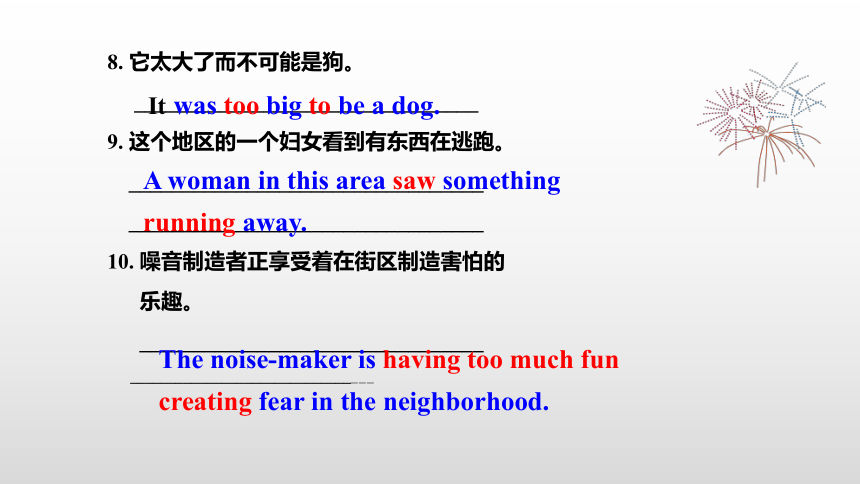
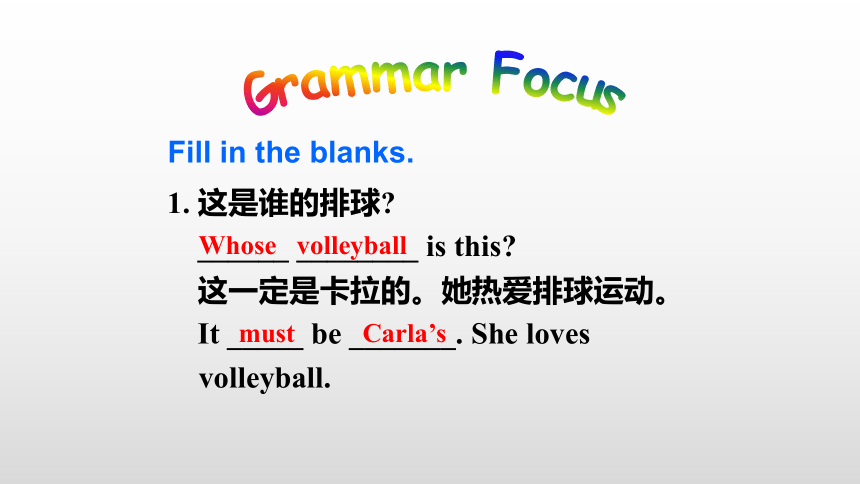
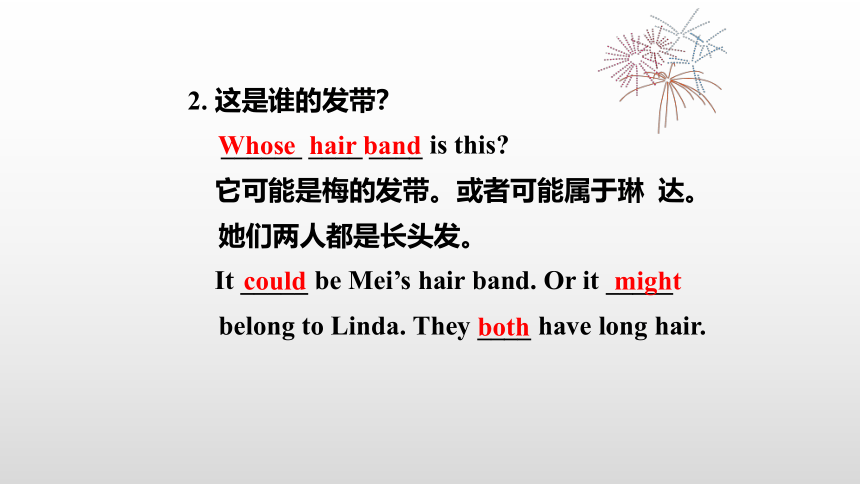
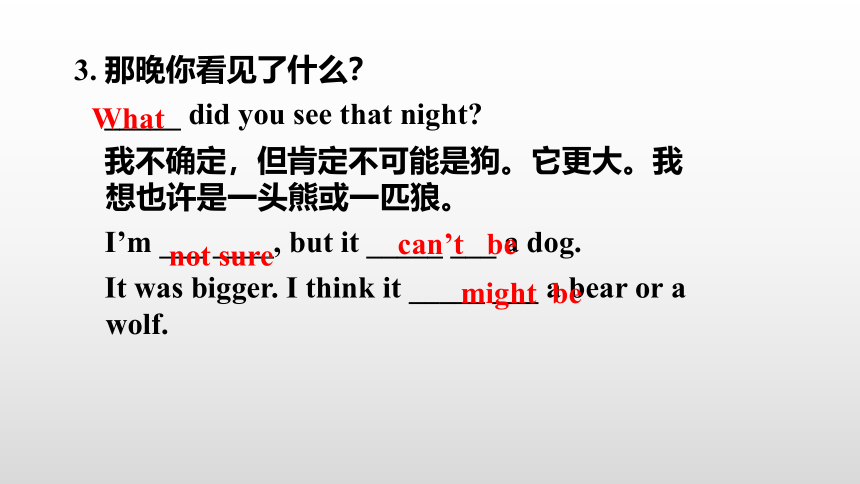
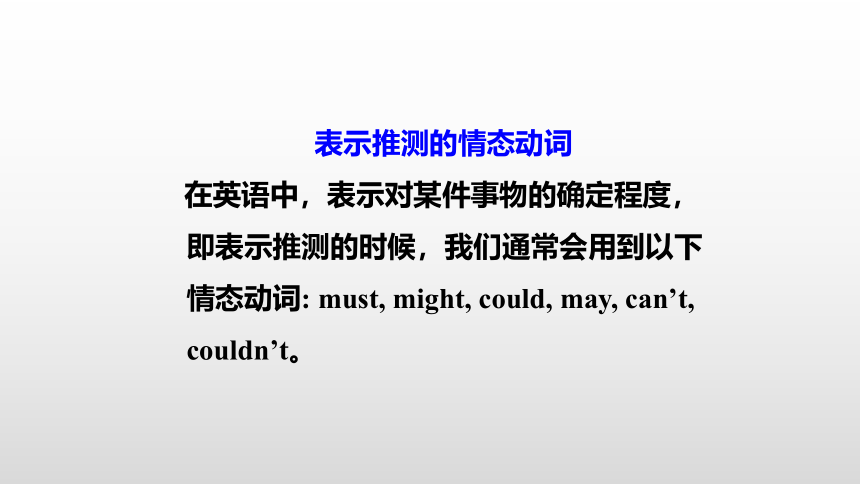
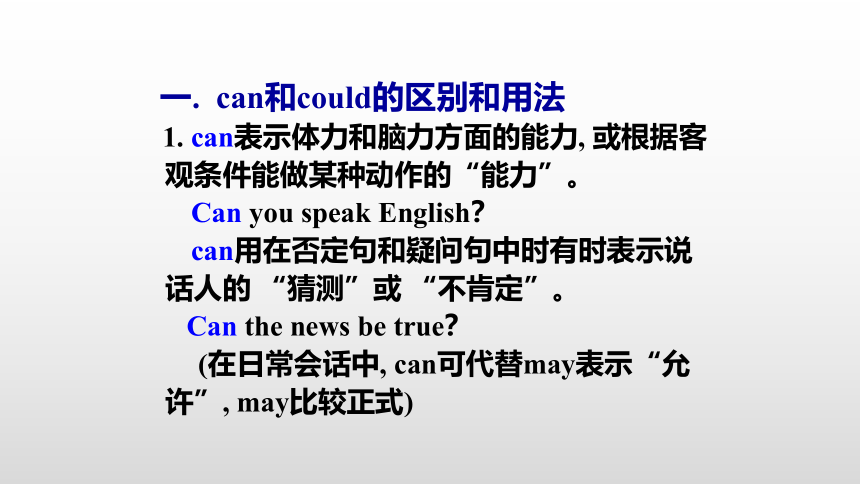
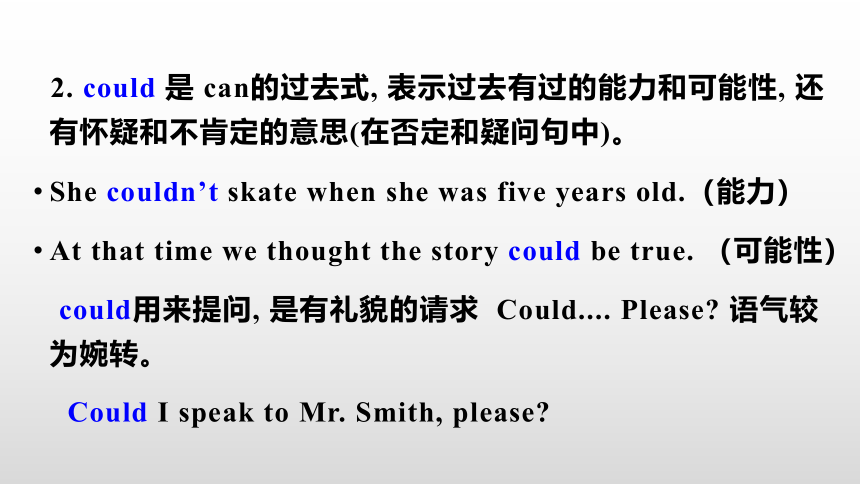
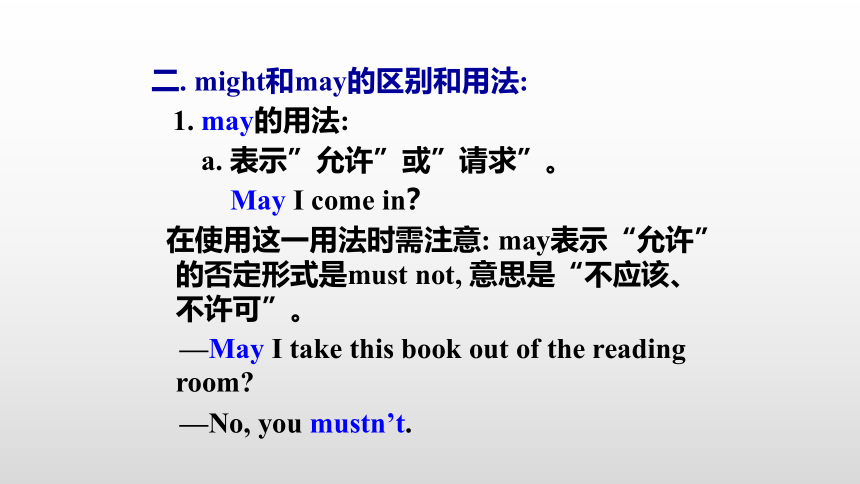
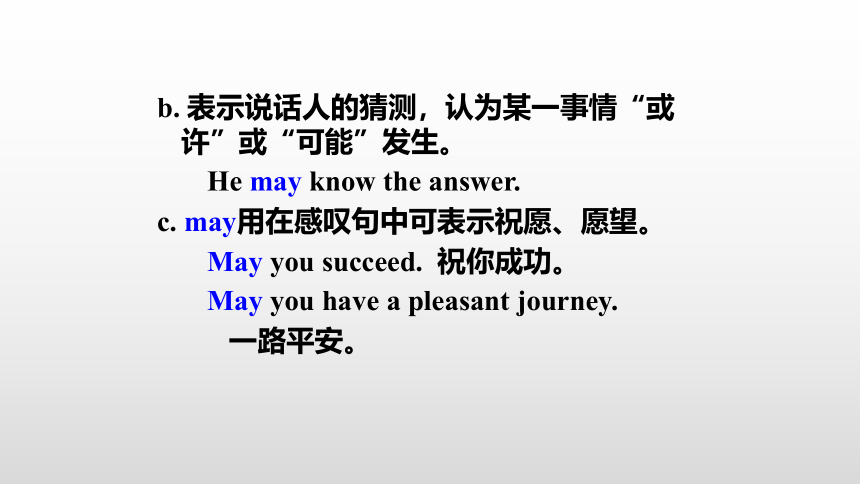
文档简介
(共37张PPT)
Unit
8
It
must
belong
to
Carla.
Section
A
(Grammar-4c)
完成句子
1.
这里过去曾是一个安静的地方。
It
_______
_______
_______
a
very
quiet
place.
2.
他说他常常听到窗外有奇怪的噪音。
He
said
he
often
_______
_______
_______
outside
the
window.
used
to
be
heard
strange
noises
3.
有些人认为一定是孩子们正在快乐玩耍。
Some
people
think
it
_______
_______
children
_______
fun.
4.
一定有人在公园里唱歌。
There
_______
_______
someone
_______
in
the
park.
5.这能是真的吗?
___________
this
be
true?
must
be
having
must
be
singing
Can
/
Could
8.
它太大了而不可能是狗。
________________________________
9.
这个地区的一个妇女看到有东西在逃跑。
_________________________________
_________________________________
10.
噪音制造者正享受着在街区制造害怕的
乐趣。
________________________________
________________________________
It
was
too
big
to
be
a
dog.
A
woman
in
this
area
saw
something
running
away.
The
noise-maker
is
having
too
much
fun
creating
fear
in
the
neighborhood.
1.
这是谁的排球?
______
________
is
this?
这一定是卡拉的。她热爱排球运动。
It
_____
be
_______.
She
loves
volleyball.
Whose
volleyball
must
Carla’s
Fill
in
the
blanks.
Grammar
Focus
2.
这是谁的发带?
______
____
____
is
this?
它可能是梅的发带。或者可能属于琳
达。她们两人都是长头发。
It
_____
be
Mei’s
hair
band.
Or
it
_____
belong
to
Linda.
They
____
have
long
hair.
could
might
both
Whose
hair
band
3.
那晚你看见了什么?
_____
did
you
see
that
night?
我不确定,但肯定不可能是狗。它更大。我想也许是一头熊或一匹狼。
I’m
___
____,
but
it
_____
___
a
dog.
It
was
bigger.
I
think
it
_____
___
a
bear
or
a
wolf.
What
not
sure
can’t
be
might
be
表示推测的情态动词
在英语中,表示对某件事物的确定程度,即表示推测的时候,我们通常会用到以下情态动词:
must,
might,
could,
may,
can’t,
couldn’t。
一.
can和could的区别和用法
1.
can表示体力和脑力方面的能力,
或根据客观条件能做某种动作的“能力”。
Can
you
speak
English?
can用在否定句和疑问句中时有时表示说话人的
“猜测”或
“不肯定”。
Can
the
news
be
true?
(在日常会话中,
can可代替may表示“允许”,
may比较正式)
2.
could
是
can的过去式,
表示过去有过的能力和可能性,
还有怀疑和不肯定的意思(在否定和疑问句中)。
She
couldn’t
skate
when
she
was
five
years
old.(能力)
At
that
time
we
thought
the
story
could
be
true.
(可能性)
could用来提问,
是有礼貌的请求
Could....
Please?
语气较为婉转。
Could
I
speak
to
Mr.
Smith,
please?
二.
might和may的区别和用法:
1.
may的用法:
a.
表示”允许”或”请求”。
May
I
come
in?
在使用这一用法时需注意:
may表示“允许”的否定形式是must
not,
意思是“不应该、不许可”。
—May
I
take
this
book
out
of
the
reading
room?
—No,
you
mustn’t.
b.
表示说话人的猜测,认为某一事情“或许”或“可能”发生。
He
may
know
the
answer.
c.
may用在感叹句中可表示祝愿、愿望。
May
you
succeed.
祝你成功。
May
you
have
a
pleasant
journey.
一路平安。
2.
might的用法:
a.
might可以代替may,
表示现在时间的动作,但语气较为婉转客气或更加不肯定。
Might
I
offer
a
suggestion?
b.
might用来表示现在时间时,
还可表示”规劝”。
You
might
pay
more
attention
to
spoken
English.
三.
must与have
to的区别
have
to比较强调客观需要,
must着重说明主观看法,另外have
to能用于更多时态。比较下面的句子:
My
brother
was
seriously
ill,
so
I
had
to
call
the
doctor
in
the
middle
of
the
night.
(客观上需要做这件事)
He
said
that
they
must
work
hard.
(主观上要做这件事)
有时两者都可以用,
意思差别不大。
We
must
/
have
to
leave
now.
must在表示说话人对事物的推测时,它比may肯定得多,
相当于汉语的“一定”或“准是”。(只有在肯定句中能这样用。)
This
must
be
your
room.
在回答由must引起的问题时,
如果是否定的答复,不能用mustn’t,
而需要用needn’t或don’t
have
to,
因为mustn’t是“一定不要”的意思,表示禁止。
--
Must
I
hand
in
my
homework
now?
--
No,
you
needn’t.
情态动词表示推测可以分为以下几种情况:
★情态动词+
do
?此结构表示对现在或将来情况的推测和判断
—Do
you
know
where
she
is
now?
—I
think
she
might
travel
in
Beijing.
????
★情态动词+
be
doing
?此结构表示对现在或将来正在进行的情况的推测和判断。
At
this
moment,
my
father
can’t
be
working
in
the
office.
★情态动词+
have
done
????此结构表示对过去情况的推测和判断。
The
road
is
wet.
It
must
have
rained
last
night.
????
★情态动词+
have
been
doing
???此结构表示对过去正在进行的情况的推测和判断。
Your
mother
must
have
been
looking
for
you
at
that
moment.
4a
Choose
the
best
way
to
complete
each
sentence
using
the
words
in
brackets.
1.
A:
Where’s
Jean?
B:
I’m
not
sure.
She
________
(is/
might
be/
must
be)
in
the
laboratory.
might
be
n.
实验室
2.
A:
Everyone
is
going
to
the
pool
after
school.
B:
Really?
It
_______
(must
be
/
can’t
be
/could
be
)
hot
________.
must
be
adv.
在户外,在野外
outdoors
3.
A:
That’s
the
phone.
B:
Hmm.
I
wonder
who
it
_______
(must
be
/
could
be
/
should
be).
could
be
4.
A:
I
wonder
if
these
are
Jim’s
glasses.
B:
They
_______
(can’t
be
/
might
be
/
could
be)
his.
He
doesn’t
wear
glasses.
can’t
be
5.
A:
I
hear
water
running
in
the
bathroom.
B:
It
________________
(could
be
/
must
be
/
can’t
be)
Carla.
She
was
__________
taking
a
shower.
could
be/
must
be
thinking
of
1.
A:
Many
people
are
wearing
coats.
B:
The
weather
must
be
_____________
____________.
2.
A:
Sally
has
been
coughing
a
lot.
B:
She
might
be
____________________.
getting
colder/
cold
outside
having
a
sore
throat/
ill
4b
Complete
these
responses.
n.
外套
3.
A:
This
restaurant
is
always
very
crowded.
B:
The
food
________________.
4.
A:
Whenever
I
try
to
read
this
book,
I
feel
sleepy.
B:
It
can’t
_________________.
must
be
delicious
be
very
interesting
Look
at
this
picture
of
a
room.
How
much
can
you
tell
about
the
person
who
lives
here?
Is
it
a
boy
or
a
girl?
What
are
his/her
hobbies?
Discuss
your
ideas
with
a
partner.
4c
It
could
be
a
girl’s
room
because
it’s
very
tidy.
I
guess
so.
But
it
might
be
a
boy’s
room
because
the
clothes
look
like
boys’
clothes.
情态动词表推测
情态动词must,can,could,may和might均可表示推测,它们可以对过去、现在或将来的情况作出语气强弱不同的推测。
?
确定的推测
含义
不确定的推测(可能性依次减弱)
含义
肯定句
must
一定;必定
can>could>
may>might
可能
否定句
can’t>couldn’t
不可能
may
not>
might
not
不大
可能
can和could也可以用于疑问句中表示推测。
情态动词表示推测有以下几种结构表示:
??
情态动词+
do
/
be
(表示对现在或将来的动作或状态推测)
be
doing
(表示对正在发生的事情推测)
have
done
(表示对过去发生的事情推测)
must表推测时不用否定形式,如果用否定,mustn’t
表示“禁止;不许”,而不表示推测。
表示“一定不会”用can’t
be。
根据句意,
从方框中选择正确的情态动词填空,
每项限用一次。
should,
must,
can’t,
may
not,
mustn’t
1.
That
______
be
Lucy.
She
has
gone
to
????
Beijing
on
business.
2.
There
_________
be
something
wrong
????
with
my
watch.
It
isn’t
working
now.
can’t
must
3.
He
________
know
the
answer,
either.
Let’s
ask
that
policeman.
4.
You
_______
swim
in
the
river.
It’s
dangerous.
5.
You
________
look
after
your
parents
when
they
become
older.
It’s
your
duty.
may
not
mustn’t
should
用must,
might,
could或can’t
填空
The
toy
car
_______
be
Jim’s.
He
is
the
only
kid
at
the
picnic.
2.
This
Mp5
_______
be
Linda’s.
I
know
she
has
one.
3.
The
mobile
phone
_______
belong
to
Lucy
or
Lily.
They
both
have
mobile
phones.
4.
The
man
_______
be
Mr
Smith.
He
has
gone
to
Shanghai
and
he’ll
be
back
in
three
days.
must
could
/
might
could
/
might
can’t
【浙江湖州】
—
Who’s
singing
in
the
next
room?
—
It
____
be
her.
She
has
gone
to
New
York.
A.
can’t
B.
must
C.
shouldn’t
D.
can
【解析】考查情态动词表推测。表示否定推测时,用can’t,意为“一定不……”。must表示推测时,意为“一定……”,用于肯定句;根据答语“她已经去了纽约”可知是否定推测,故选A。
中考链接
【湖北黄冈】41.
—Whose
T
-
shirt
is
this?
—It
______
be
John'
s.
It’s
______
small
for
him.
A.
can't;
much
too
B.
can't;
too
much
C.
mustn't;
much
too
D.
mustn't;
too
much
【解析】情态动词的用法。根据句意“它不可能是约翰的,对他来说太小了。”故排除C、D,too
much为“太多”的意思,much
too为“太”。故选A。
【天津】—
Where
are
you
going
this
month?
—
We______
go
to
Xiamen,
but
we're
not
sure.
A.
needn’t
B.
must
C.
might
D.
mustn't
【解析】
needn’t
(不必)表建议;
must
(一定)表猜测的可能性很大;
might
(可能,也许)表不是很肯定的猜测。
mustn't(不允许)表命令。句意:---这个月你们将去哪?---我们或许去厦门,但还不确定。
C
【福建泉州】---
Have
you
decided
where
to
go
for
your
summer
vacation?
---
Not
yet.
We
_______
go
to
Qingdao.
It's
a
good
place
for
vacation.
A.
may
B.
need
C.
must
【解析】句意:---
你已经决定到哪里过暑假了吗?---
还没有呢,我们也许去青岛,那是个度假的好地方。情态动词表示推测时,may表“可能”,must表“一定”,can’t表“不可能”。
A
【铜仁】—
Must
I
water
the
flowers
now,
mum?
—No,
you
______.
You
_____
do
it
later.
A.
mustn’t;
must
B.
mustn’t;
may
C.
needn’t;
may
D.
needn’t;
must
【连云港】—
______
I
know
by
what
time
you
want
the
project
to
be
done?
—By
the
day
after
tomorrow.
______
you
finish
it
on
time?
A.
May;
Can
B.
Must;
Need
C.
Could;
Must
D.
Need;
Would
C
A
【长沙】—Who’s
singing
in
the
garden?
—It
______
be
Mr.
Brown.
He
always
practices
singing
at
this
time.
A.
must
B.
can’t
C.
need
【河北】I
______
follow
you.
Would
you
please
repeat
it?
A.
can’t
B.
mustn’t
C.
needn’t
D.
shouldn’t
A
A
Unit
8
It
must
belong
to
Carla.
Section
A
(Grammar-4c)
完成句子
1.
这里过去曾是一个安静的地方。
It
_______
_______
_______
a
very
quiet
place.
2.
他说他常常听到窗外有奇怪的噪音。
He
said
he
often
_______
_______
_______
outside
the
window.
used
to
be
heard
strange
noises
3.
有些人认为一定是孩子们正在快乐玩耍。
Some
people
think
it
_______
_______
children
_______
fun.
4.
一定有人在公园里唱歌。
There
_______
_______
someone
_______
in
the
park.
5.这能是真的吗?
___________
this
be
true?
must
be
having
must
be
singing
Can
/
Could
8.
它太大了而不可能是狗。
________________________________
9.
这个地区的一个妇女看到有东西在逃跑。
_________________________________
_________________________________
10.
噪音制造者正享受着在街区制造害怕的
乐趣。
________________________________
________________________________
It
was
too
big
to
be
a
dog.
A
woman
in
this
area
saw
something
running
away.
The
noise-maker
is
having
too
much
fun
creating
fear
in
the
neighborhood.
1.
这是谁的排球?
______
________
is
this?
这一定是卡拉的。她热爱排球运动。
It
_____
be
_______.
She
loves
volleyball.
Whose
volleyball
must
Carla’s
Fill
in
the
blanks.
Grammar
Focus
2.
这是谁的发带?
______
____
____
is
this?
它可能是梅的发带。或者可能属于琳
达。她们两人都是长头发。
It
_____
be
Mei’s
hair
band.
Or
it
_____
belong
to
Linda.
They
____
have
long
hair.
could
might
both
Whose
hair
band
3.
那晚你看见了什么?
_____
did
you
see
that
night?
我不确定,但肯定不可能是狗。它更大。我想也许是一头熊或一匹狼。
I’m
___
____,
but
it
_____
___
a
dog.
It
was
bigger.
I
think
it
_____
___
a
bear
or
a
wolf.
What
not
sure
can’t
be
might
be
表示推测的情态动词
在英语中,表示对某件事物的确定程度,即表示推测的时候,我们通常会用到以下情态动词:
must,
might,
could,
may,
can’t,
couldn’t。
一.
can和could的区别和用法
1.
can表示体力和脑力方面的能力,
或根据客观条件能做某种动作的“能力”。
Can
you
speak
English?
can用在否定句和疑问句中时有时表示说话人的
“猜测”或
“不肯定”。
Can
the
news
be
true?
(在日常会话中,
can可代替may表示“允许”,
may比较正式)
2.
could
是
can的过去式,
表示过去有过的能力和可能性,
还有怀疑和不肯定的意思(在否定和疑问句中)。
She
couldn’t
skate
when
she
was
five
years
old.(能力)
At
that
time
we
thought
the
story
could
be
true.
(可能性)
could用来提问,
是有礼貌的请求
Could....
Please?
语气较为婉转。
Could
I
speak
to
Mr.
Smith,
please?
二.
might和may的区别和用法:
1.
may的用法:
a.
表示”允许”或”请求”。
May
I
come
in?
在使用这一用法时需注意:
may表示“允许”的否定形式是must
not,
意思是“不应该、不许可”。
—May
I
take
this
book
out
of
the
reading
room?
—No,
you
mustn’t.
b.
表示说话人的猜测,认为某一事情“或许”或“可能”发生。
He
may
know
the
answer.
c.
may用在感叹句中可表示祝愿、愿望。
May
you
succeed.
祝你成功。
May
you
have
a
pleasant
journey.
一路平安。
2.
might的用法:
a.
might可以代替may,
表示现在时间的动作,但语气较为婉转客气或更加不肯定。
Might
I
offer
a
suggestion?
b.
might用来表示现在时间时,
还可表示”规劝”。
You
might
pay
more
attention
to
spoken
English.
三.
must与have
to的区别
have
to比较强调客观需要,
must着重说明主观看法,另外have
to能用于更多时态。比较下面的句子:
My
brother
was
seriously
ill,
so
I
had
to
call
the
doctor
in
the
middle
of
the
night.
(客观上需要做这件事)
He
said
that
they
must
work
hard.
(主观上要做这件事)
有时两者都可以用,
意思差别不大。
We
must
/
have
to
leave
now.
must在表示说话人对事物的推测时,它比may肯定得多,
相当于汉语的“一定”或“准是”。(只有在肯定句中能这样用。)
This
must
be
your
room.
在回答由must引起的问题时,
如果是否定的答复,不能用mustn’t,
而需要用needn’t或don’t
have
to,
因为mustn’t是“一定不要”的意思,表示禁止。
--
Must
I
hand
in
my
homework
now?
--
No,
you
needn’t.
情态动词表示推测可以分为以下几种情况:
★情态动词+
do
?此结构表示对现在或将来情况的推测和判断
—Do
you
know
where
she
is
now?
—I
think
she
might
travel
in
Beijing.
????
★情态动词+
be
doing
?此结构表示对现在或将来正在进行的情况的推测和判断。
At
this
moment,
my
father
can’t
be
working
in
the
office.
★情态动词+
have
done
????此结构表示对过去情况的推测和判断。
The
road
is
wet.
It
must
have
rained
last
night.
????
★情态动词+
have
been
doing
???此结构表示对过去正在进行的情况的推测和判断。
Your
mother
must
have
been
looking
for
you
at
that
moment.
4a
Choose
the
best
way
to
complete
each
sentence
using
the
words
in
brackets.
1.
A:
Where’s
Jean?
B:
I’m
not
sure.
She
________
(is/
might
be/
must
be)
in
the
laboratory.
might
be
n.
实验室
2.
A:
Everyone
is
going
to
the
pool
after
school.
B:
Really?
It
_______
(must
be
/
can’t
be
/could
be
)
hot
________.
must
be
adv.
在户外,在野外
outdoors
3.
A:
That’s
the
phone.
B:
Hmm.
I
wonder
who
it
_______
(must
be
/
could
be
/
should
be).
could
be
4.
A:
I
wonder
if
these
are
Jim’s
glasses.
B:
They
_______
(can’t
be
/
might
be
/
could
be)
his.
He
doesn’t
wear
glasses.
can’t
be
5.
A:
I
hear
water
running
in
the
bathroom.
B:
It
________________
(could
be
/
must
be
/
can’t
be)
Carla.
She
was
__________
taking
a
shower.
could
be/
must
be
thinking
of
1.
A:
Many
people
are
wearing
coats.
B:
The
weather
must
be
_____________
____________.
2.
A:
Sally
has
been
coughing
a
lot.
B:
She
might
be
____________________.
getting
colder/
cold
outside
having
a
sore
throat/
ill
4b
Complete
these
responses.
n.
外套
3.
A:
This
restaurant
is
always
very
crowded.
B:
The
food
________________.
4.
A:
Whenever
I
try
to
read
this
book,
I
feel
sleepy.
B:
It
can’t
_________________.
must
be
delicious
be
very
interesting
Look
at
this
picture
of
a
room.
How
much
can
you
tell
about
the
person
who
lives
here?
Is
it
a
boy
or
a
girl?
What
are
his/her
hobbies?
Discuss
your
ideas
with
a
partner.
4c
It
could
be
a
girl’s
room
because
it’s
very
tidy.
I
guess
so.
But
it
might
be
a
boy’s
room
because
the
clothes
look
like
boys’
clothes.
情态动词表推测
情态动词must,can,could,may和might均可表示推测,它们可以对过去、现在或将来的情况作出语气强弱不同的推测。
?
确定的推测
含义
不确定的推测(可能性依次减弱)
含义
肯定句
must
一定;必定
can>could>
may>might
可能
否定句
can’t>couldn’t
不可能
may
not>
might
not
不大
可能
can和could也可以用于疑问句中表示推测。
情态动词表示推测有以下几种结构表示:
??
情态动词+
do
/
be
(表示对现在或将来的动作或状态推测)
be
doing
(表示对正在发生的事情推测)
have
done
(表示对过去发生的事情推测)
must表推测时不用否定形式,如果用否定,mustn’t
表示“禁止;不许”,而不表示推测。
表示“一定不会”用can’t
be。
根据句意,
从方框中选择正确的情态动词填空,
每项限用一次。
should,
must,
can’t,
may
not,
mustn’t
1.
That
______
be
Lucy.
She
has
gone
to
????
Beijing
on
business.
2.
There
_________
be
something
wrong
????
with
my
watch.
It
isn’t
working
now.
can’t
must
3.
He
________
know
the
answer,
either.
Let’s
ask
that
policeman.
4.
You
_______
swim
in
the
river.
It’s
dangerous.
5.
You
________
look
after
your
parents
when
they
become
older.
It’s
your
duty.
may
not
mustn’t
should
用must,
might,
could或can’t
填空
The
toy
car
_______
be
Jim’s.
He
is
the
only
kid
at
the
picnic.
2.
This
Mp5
_______
be
Linda’s.
I
know
she
has
one.
3.
The
mobile
phone
_______
belong
to
Lucy
or
Lily.
They
both
have
mobile
phones.
4.
The
man
_______
be
Mr
Smith.
He
has
gone
to
Shanghai
and
he’ll
be
back
in
three
days.
must
could
/
might
could
/
might
can’t
【浙江湖州】
—
Who’s
singing
in
the
next
room?
—
It
____
be
her.
She
has
gone
to
New
York.
A.
can’t
B.
must
C.
shouldn’t
D.
can
【解析】考查情态动词表推测。表示否定推测时,用can’t,意为“一定不……”。must表示推测时,意为“一定……”,用于肯定句;根据答语“她已经去了纽约”可知是否定推测,故选A。
中考链接
【湖北黄冈】41.
—Whose
T
-
shirt
is
this?
—It
______
be
John'
s.
It’s
______
small
for
him.
A.
can't;
much
too
B.
can't;
too
much
C.
mustn't;
much
too
D.
mustn't;
too
much
【解析】情态动词的用法。根据句意“它不可能是约翰的,对他来说太小了。”故排除C、D,too
much为“太多”的意思,much
too为“太”。故选A。
【天津】—
Where
are
you
going
this
month?
—
We______
go
to
Xiamen,
but
we're
not
sure.
A.
needn’t
B.
must
C.
might
D.
mustn't
【解析】
needn’t
(不必)表建议;
must
(一定)表猜测的可能性很大;
might
(可能,也许)表不是很肯定的猜测。
mustn't(不允许)表命令。句意:---这个月你们将去哪?---我们或许去厦门,但还不确定。
C
【福建泉州】---
Have
you
decided
where
to
go
for
your
summer
vacation?
---
Not
yet.
We
_______
go
to
Qingdao.
It's
a
good
place
for
vacation.
A.
may
B.
need
C.
must
【解析】句意:---
你已经决定到哪里过暑假了吗?---
还没有呢,我们也许去青岛,那是个度假的好地方。情态动词表示推测时,may表“可能”,must表“一定”,can’t表“不可能”。
A
【铜仁】—
Must
I
water
the
flowers
now,
mum?
—No,
you
______.
You
_____
do
it
later.
A.
mustn’t;
must
B.
mustn’t;
may
C.
needn’t;
may
D.
needn’t;
must
【连云港】—
______
I
know
by
what
time
you
want
the
project
to
be
done?
—By
the
day
after
tomorrow.
______
you
finish
it
on
time?
A.
May;
Can
B.
Must;
Need
C.
Could;
Must
D.
Need;
Would
C
A
【长沙】—Who’s
singing
in
the
garden?
—It
______
be
Mr.
Brown.
He
always
practices
singing
at
this
time.
A.
must
B.
can’t
C.
need
【河北】I
______
follow
you.
Would
you
please
repeat
it?
A.
can’t
B.
mustn’t
C.
needn’t
D.
shouldn’t
A
A
同课章节目录
- Unit 1 How can we become good learners.
- Section A
- Section B
- Unit 2 I think that mooncakes are delicious!
- Section A
- Section B
- Unit 3 Could you please tell me where the restroom
- Section A
- Section B
- Unit 4 I used to be afraid of the dark.
- Section A
- Section B
- Unit 5 What are the shirts made of?
- Section A
- Section B
- Review of Units 1-5
- Unit 6 When was it invented?
- Section A
- Section B
- Unit 7 Teenagers should be allowed to choose their
- Section A
- Section B
- Unit 8 It must belong to Carla.
- Section A
- Section B
- Unit 9 I like music that I can dance to.
- Section A
- Section B
- Unit 10 You're supposed to shake hands.
- Section A
- Section B
- Review of Units 6-10
- Unit 11 Sad movies make me cry.
- Section A
- Section B
- Unit 12 Life is full of the unexpected
- Section A
- Section B
- Unit 13 We're trying to save the earth!
- Section A
- Section B
- Unit 14 I remember meeting all of you in Grade 7.
- Section A
- Section B
- Review of Units 11-14
